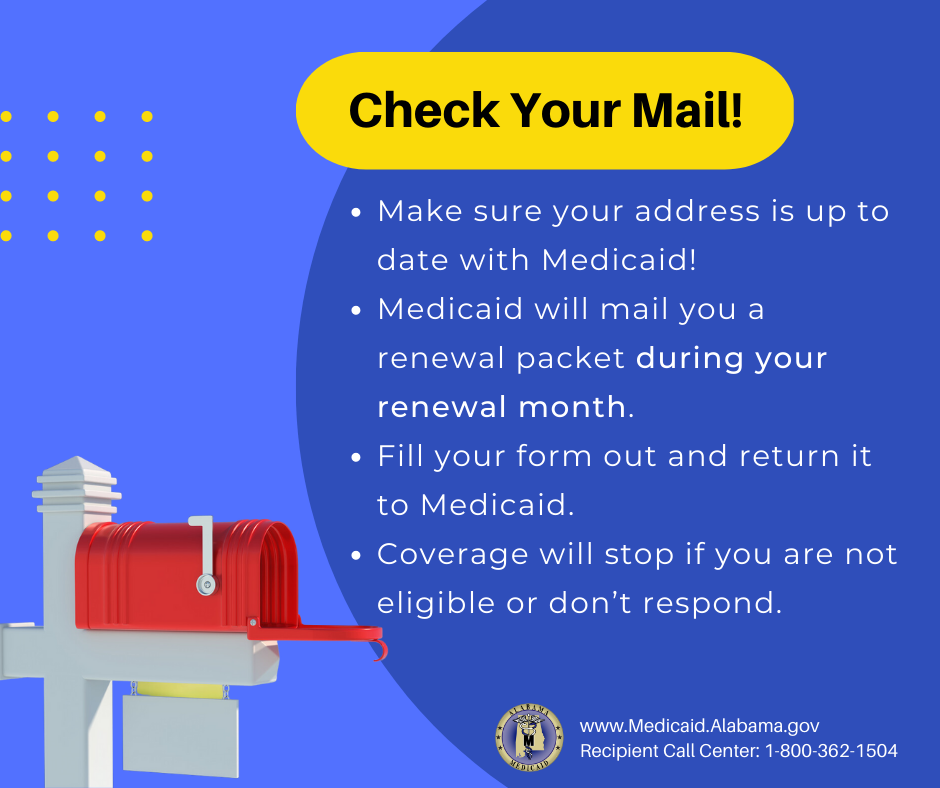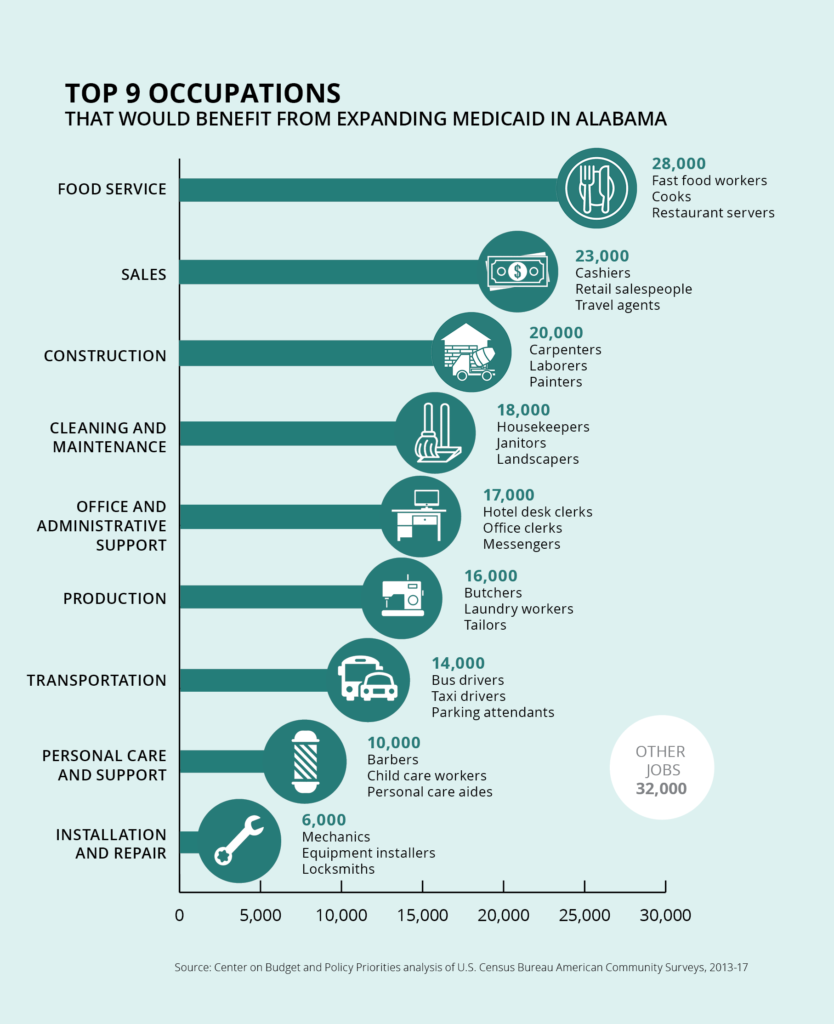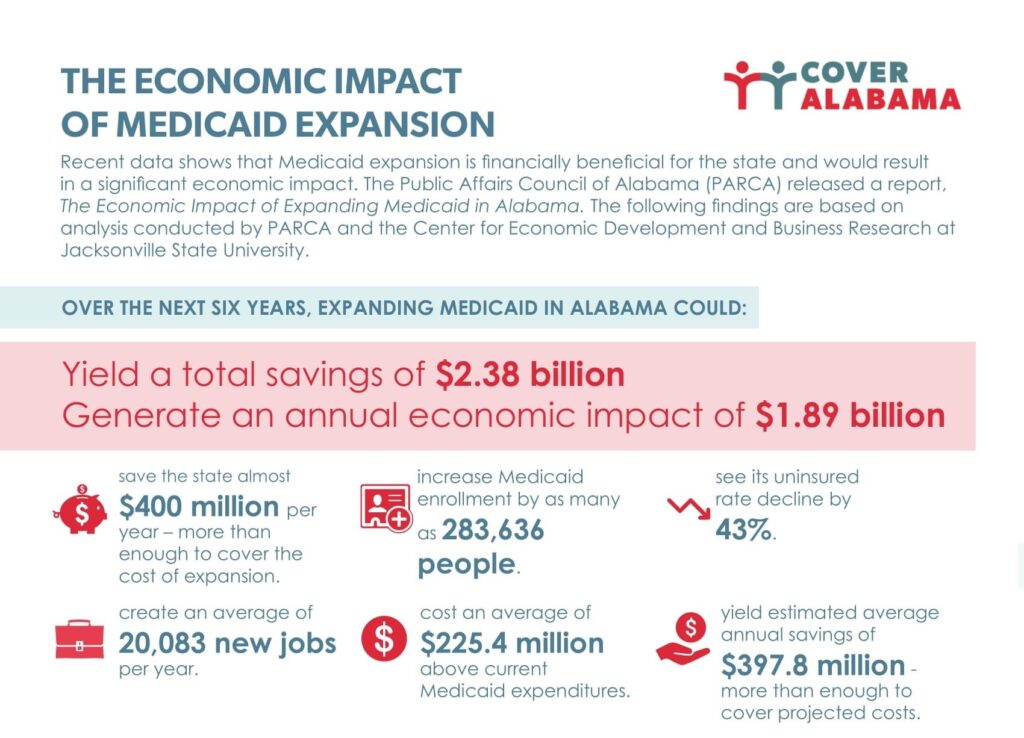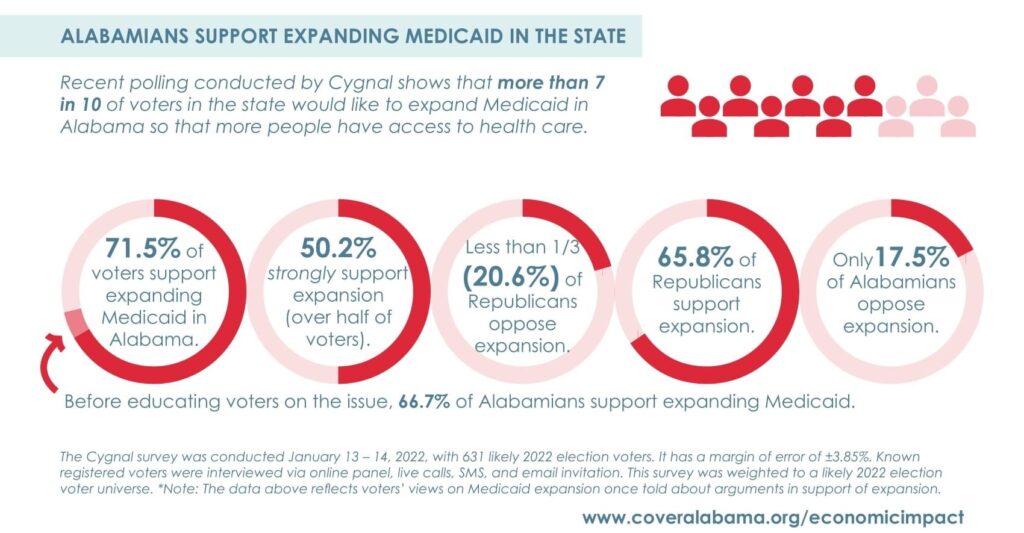Issue: Medicaid Expansion
Expand Medicaid and close Alabama’s health coverage gap
For years, Gov. Kay Ivey and legislators have said cost is the barrier to covering Alabamians with low incomes through Medicaid. However, thanks to new federal incentives for Medicaid expansion, any concerns about that barrier are gone. Now more than ever before, we have the opportunity to ensure no Alabamian has to choose between going to the doctor and putting food on the table.
More than 70% of Alabamians support Medicaid expansion, including 66% of Republican voters, according to a January 2022 poll, and opening up Medicaid coverage to adults with low incomes is the single biggest step Alabama can take to restore health, save our rural hospitals and boost our state’s economic recovery.
Who would gain coverage under Medicaid expansion?
Medicaid expansion would ensure coverage for nearly 300,000 Alabamians, including:
- People who work low-wage jobs and can’t afford private coverage
- Workers who are between jobs
- Adults who are caring for children or older family members at home
- People who have disabilities and are awaiting SSI determinations
- Adult college students
- Uninsured veterans
How would Medicaid expansion boost the economy?
Medicaid expansion would bring our federal tax dollars home to support:
- Healthier families, workers and communities
- Stronger rural hospitals and clinics
- Stronger community mental health and substance use disorder services
- A needed boost in jobs and revenue for state and local economies
How would Medicaid expansion keep people healthier?
Medicaid expansion would help Alabamians stay healthy by ensuring pathways to:
- Regular primary care and preventive checkups
- Earlier detection and treatment of serious health problems
- Regular OB/GYN visits without referral
- Less dependence on costly emergency care
- Better health and greater financial peace of mind
How would Medicaid expansion reduce health disparities?
Medicaid expansion would promote health equity in Alabama by:
- Reducing the racial/ethnic disparities in health coverage
- Lowering the high rate of Black infant deaths
- Lowering the high rate of Black maternal deaths
- Covering chronic health conditions that disproportionately affect people of color and make them more vulnerable to COVID-19 complications
Bottom line
Medicaid expansion would save lives, create jobs and strengthen Alabama’s health care system. Closing the health coverage gap is one of the biggest policy changes available to move our state forward. The governor and the Legislature should embrace this opportunity to build a brighter, healthier future for Alabama.
Join our Cover Alabama campaign!
An end to Alabama’s coverage gap is within reach. Through our Cover Alabama campaign, Alabama Arise is working to ensure that every Alabamian can afford to get the health care they need when they need it. Visit coveralabama.org to learn more and add your name to our ever-growing list of supporters.
Arise legislative update: March 6, 2023
Before the Alabama Legislature returns this week, Arise’s Akiesha Anderson welcomes everyone with an update on an upcoming special session on federal American Rescue Plan Act funds and an overview of Arise’s member-chosen policy priorities for 2023.
Fresh opportunities to push for a better Alabama
The Alabama Legislature will welcome 37 new lawmakers to its halls when its 2023 regular session begins March 7. Alabama Arise sees this as an opportunity to educate new legislators and identify new allies on issues of importance to our members. We urge folks to join us in calling for change, including at Arise Legislative Day on April 11.
Eliminate the state grocery tax
In early February, 11% of Alabama households said they sometimes or often didn’t have enough food to eat. And those hunger challenges are even more severe in communities of color. More than 23% of Black Alabamians and 13.6% of Hispanic Alabamians said they sometimes or often didn’t have enough food.
Untaxing groceries would help families across Alabama keep food on the table. As we have for more than two decades, Arise once again will support bills this year to remove the state’s 4% sales tax on groceries. We also will support replacing the grocery tax revenue by limiting or ending a tax loophole for the wealthiest households. This legislation by Sen. Andrew Jones, R-Centre, and Rep. Penni McClammy, D-Montgomery, would empower Alabama to untax groceries while protecting funding for public schools.
Expand Medicaid to close the health coverage gap
For nearly a decade, Alabama has been outside looking in on a good deal. While hundreds of thousands of Alabamians continue to struggle without health insurance, state leaders have failed to expand Medicaid. Alabama is one of just 11 states that has yet to expand Medicaid. And that inaction has left more than 220,000 Alabamians in a health coverage gap.
Fifteen rural hospitals in Alabama are at imminent risk of closing this year if state leaders don’t act soon to protect health care access. Gov. Kay Ivey should act swiftly to expand Medicaid herself, but the Legislature’s support also will be vital. Arise will keep working to educate lawmakers and the public on the economic, budgetary and humanitarian benefits of Medicaid expansion.
Take bold steps to reform our criminal justice system
Legislators have an opportunity and an obligation to make strides in solving the many problems within Alabama’s criminal justice system. This issue has added urgency as Alabama faces a U.S. Department of Justice lawsuit alleging unconstitutional prison conditions.
Many avenues for progress exist. Arise will urge lawmakers to end the practice of suspending driver’s licenses for debt-based reasons. We will advocate for reform of the state “three-strikes” law, known as the Habitual Felony Offender Act. And we will support a bill to require the jury to be unanimous before imposing the death penalty.
Address housing and transportation needs
State House insiders expect the Legislature to go into a special session this spring to decide how to use remaining federal funds under the American Rescue Plan Act (ARPA). From the start, Arise has taken the position that Alabama should use some of its ARPA funds to jump-start public transportation and help thousands find an affordable place to call home.
During the probable special session, we will continue to uplift the need for these investments in the people of Alabama. Learn more at alarise.org/arpatoolkit.
Budget priorities for the people
Two weeks before the Alabama Legislature’s 2023 regular session, lawmakers, lobbyists and advocates packed into the State House in late February for the annual joint legislative budget hearings. One might call it the Super Bowl for budget nerds.
After years of scarcity, both Alabama budgets are starting out with a revenue surplus. There’s $351 million in “excess” revenue for the General Fund, and $2.7 billion for the Education Trust Fund. That’s not even counting the remaining $1.1 billion in American Rescue Plan Act (ARPA) funds still awaiting allocation.
What we heard at this year’s budget hearings was not surprising. Public services like education, health care, mental health and supportive services need more resources after years of underinvestment. State agencies are struggling with worker shortages and the consequences of underfunding – and understaffing – critical programs. It’s no surprise that lawmakers heard a long, detailed list of opportunities to meet these needs. Most agency heads were clear that new funding can’t fix all of the problems – but it’s a start.
Some lawmakers have floated the idea that this one-time surplus is a sign we need a tax rebate. If that proposal materializes, Arise will be front and center advocating for funds to go directly to low- and moderate-income households bearing the brunt of higher costs. But Arise’s proposal, which comes directly from listening to our members, is a longer-term solution to our upside-down tax code. Our bill to untax groceries would help families keep food on the table while also protecting funding for public schools. It’s a solution that goes beyond just one year to create more foundational and sustainable change.
One concern you may have heard is that nobody has enough workers. Too many Alabamians are still disconnected from the workforce due to missing critical infrastructure investments in child care, public transportation, health care and affordable housing. This year, we’ll be pushing for investments in these supports to help people get and keep work, and to build the healthy and educated workforce Alabama needs.
Our 2023 policy proposals provide that roadmap for change. Expand Medicaid to ensure nobody has to die for lack of preventive care or live in poverty because they have a chronic health condition. Invest in infrastructure to support workers, including child care, housing, public transportation and education. Stop funding public services with punitive fines and fees, and start ensuring the wealthiest Alabamians pay their fair share.
We look forward to seeing you all at our Legislative Day this April. If we continue to stand and work together, we will make significant progress for Alabama.
See The Gap: ‘Possibilities that we just can’t afford’

Kayla is a talented, young hairstylist who has built up a successful clientele in one of Birmingham’s hippest salons. She’s been a stylist for 12 years and said she loves the independence it gives her. She sees dozens of clients every week and takes great pride in her work.
“It’s a great industry, but it’s not taken as seriously as it needs to be,” Kayla said. “Especially relative to the number of people that come through our doors to get their hair done.”
Kayla grew up in a small town in Walker County but started her career in an “Over the Mountain” suburb south of Birmingham. The salon served a wealthier clientele, but it didn’t offer many benefits to stylists. Among the benefits she didn’t have: employer-provided health insurance.
Kayla said lack of access to care is the norm in an industry where health coverage is often an afterthought.
“People love to say that college is too expensive now, so you should go into a trade,” she said. “Maybe the more dangerous trades offer benefits, but when you go into something like hair, we’re kind of left behind.”
Kayla said not many of her clients know she is working full-time while uninsured. And most don’t know how it affects her future in more ways than just going to the doctor.
“No one is talking about why we don’t have health coverage. They don’t usually even care if we have it in the first place,” she said. “No one has ever asked me. You’re the first one.”
When the cost is simply too high
During the COVID-19 pandemic, Kayla decided she needed a change and moved to a new salon. She was thrilled to learn that it offers health insurance to its stylists.
But when she and her husband ran the numbers, it just didn’t work for them. The cost was simply too high. She couldn’t justify the risk of adding such high expenses to her already stretched budget.
Kayla said she still considers herself lucky, though.
“I know I can’t afford it, but at least they offer it. Most places don’t,” she said. “None of the salons back in my rural hometown offered insurance. I don’t imagine that’s changed much since when I started in the industry.”
Kayla explored other options, but nothing panned out.
“The last time I looked at buying a plan online, I put in what I earned and it was still $600 a month,” she said. “I’m not rich. I can’t afford that.”
‘A pragmatic decision’
Kayla is one of more than 220,000 people in Alabama’s Medicaid coverage gap. She is ineligible for Alabama Medicaid or subsidized Marketplace coverage under the Affordable Care Act. And she is also unable to afford premiums for private insurance.
Kayla said she often gets anxious when she thinks about what would happen in an emergency. She said she researches what people do when they need emergency care or surgery and don’t have insurance.
Those long nights researching and worrying about costs led Kayla and her husband to the choice not to have children.
“We’re not going to have children,” she said. “I don’t even know how I’d do it, especially in Alabama.”
The budget is tight for Kayla and her husband. She said she feels it’s not fair to bring a child into the world without the resources to support one.
“Babies are just so expensive. I made a pragmatic decision to not have kids,” she said. “I’m uninsured, and these are all possibilities that we just can’t afford.”
Coverage gaps for prospective new mothers in Alabama
Kayla said she’s heard it’s easier in other states for newer moms. She’s right.
Women in Medicaid expansion states are more than twice as likely to already have coverage prior to becoming pregnant compared to women in non-expansion states, according to the Kaiser Family Foundation. Being enrolled in Medicaid throughout pregnancy means more consistent prenatal care. That leads to healthier pregnancies and reduced risk of complications or death.
An added risk in Alabama is that prospective mothers generally can’t qualify for Medicaid until they’ve confirmed they are pregnant. That means they are unable to access valuable prenatal care until later in the pregnancy.
In Alabama, Medicaid only covers pregnant people with an income up to 146% of the federal poverty level, or around $1,300 monthly for a couple. Working-age adults with no children and no disability do not qualify for Alabama Medicaid, no matter how little they make. This leaves Kayla and 50,000 other uninsured Alabama working women without any options for affordable health coverage.
Some good news for those in Kayla’s situation is that even though our state has some of the most restrictive income eligibility limits for adults, most children in Alabama are eligible for ALL Kids coverage. ALL Kids insures tens of thousands of Alabama children whose low- and middle-income households do not qualify for Medicaid.
Gov. Kay Ivey and lawmakers also recently extended postpartum Medicaid coverage for up to one year after childbirth. This would be great news for Kayla, if workers like her were eligible for ongoing Medicaid coverage. But without employer-sponsored health insurance or Medicaid expansion, Kayla said she and her husband can’t afford the high costs of prenatal care and childbirth.
‘I don’t know what I’m gonna do’
For now, Kayla said she is focusing on taking care of herself. She’s been healthy so far, but she wants to work on a plan for when she might not be
“I bought dental and vision insurance recently,” she said. “I can afford the small stuff, not the big stuff, you know?”
Kayla also sought out a clinic north of town that will work with her on copays for when she needs care for the occasional cold or injury.
“I can do $70 at a time, even though that’s kind of a lot,” she said. “That’s my only real plan. Otherwise, I don’t know what I’m gonna do.”
ABOUT ALABAMA ARISE AND COVER ALABAMA
Whit Sides is the Cover Alabama storyteller for Alabama Arise, a statewide, member-led organization advancing public policies to improve the lives of Alabamians who are marginalized by poverty. Arise’s membership includes faith-based, community, nonprofit and civic groups, grassroots leaders and individuals from across Alabama. Email: whit@alarise.org.
Arise is a founding member of the Cover Alabama coalition. Cover Alabama is a nonpartisan alliance of advocacy groups, businesses, community organizations, consumer groups, health care providers and religious congregations advocating for Alabama to provide quality, affordable health coverage to its residents and implement a sustainable health care system.
How Alabama can protect health coverage during the Medicaid ‘unwinding’ period
In 2020, we watched as the COVID-19 pandemic changed the world. Many of us searched for toilet paper, stocked up on groceries and spent a lot of quality time in our homes as we sheltered in place. But the world did not change only in our daily lives. This public health emergency (PHE) also led Medicaid officials to take additional steps to ensure people could afford to get medical care when they needed it.
As the PHE’s end approaches, though, tens of thousands of Alabamians will start paying more for critical medical care – or simply be unable to afford it – unless our state lawmakers take action. About 61,000 Alabamians are expected to lose Medicaid coverage by June 2024 due to this change, according to a report by the Robert Wood Johnson Foundation and Urban Institute.
These coverage losses and higher health care costs would come during a pandemic that is still ongoing. And they would leave many Alabamians with no realistic option for affordable coverage because our state still has not expanded Medicaid to cover adults with low incomes.
Medicaid expansion is the single best step Alabama could take to preserve health coverage and reduce costs for people who cannot afford a private plan and otherwise would be uninsured. In the meantime, state officials should be proactive in communicating with enrollees and facilitating transitions to Marketplace coverage where possible.
Continuous coverage eligibility kept many Alabamians insured
When federal officials declared the official public health emergency (PHE) in 2020, they activated measures to ensure that millions of Americans maintained access to health coverage. Medicaid, the health insurance program funded by federal and state governments and administered by states, was essential to these efforts.
Medicaid received additional federal funding to keep current and new enrollees eligible until the PHE’s end. Under this maintenance of effort (MOE) requirement, traditional eligibility criteria were relaxed.
The relaxed criteria led to continuous coverage eligibility. That meant Medicaid enrollees would not lose eligibility unless they requested in writing to be removed, moved out of state or died. Continuous coverage eligibility also meant changes in income or family size no longer caused removal from Medicaid during the PHE.
The MOE requirement increased the Alabama Medicaid rolls by approximately 50%. The additional federal funding, through an increased Federal Medical Assistance Percentage (FMAP), was necessary to help ensure everyone had access to health care services. But now that the MOE has been separated from the PHE, so too is continuous coverage eligibility. Alabama Medicaid will begin reviewing people for eligibility again starting April 1, 2023.
What is Medicaid unwinding, and how might it affect you?
The end of continuous coverage eligibility means states may return to traditional eligibility rules to determine continued Medicaid coverage. This return to normal rules is called “unwinding.” Alabama Medicaid will begin the unwinding process on April 1.
On that date, Alabama Medicaid will resume its traditional process for verification of eligibility. Alabama Medicaid officials say they will take one year to complete the unwinding process.
Current Medicaid enrollees will receive a mailing to their home addresses from Alabama Medicaid discussing these changes. Current enrollees should ensure their most current and up-to-date information is on file by visiting the recipient portal here.
Take action to maintain coverage
The stakes of unwinding are high. Approximately 61,000 Alabamians may lose their Medicaid coverage during the unwinding period. This could result in a 16% increase in the number of uninsured Alabamians.
The Alabama Unwinding Task Force, which Alabama Arise chairs, is working with Alabama Medicaid to support outreach and communication efforts. This task force is ensuring that support is available for current eligible Medicaid enrollees to maintain their coverage. It also is working to ensure that people who no longer meet Alabama Medicaid’s eligibility criteria know their available options for continued coverage. To get involved with the Unwinding Task Force, email Arise’s Jennifer Harris at jennifer@alarise.org.
Individuals who remain eligible for Medicaid could be at risk of losing coverage during unwinding due to administrative barriers. To ensure they maintain coverage, eligible enrollees first should verify their current contact information. Next, they can elect to receive text messages from Medicaid with vital information by signing up here. And finally, enrollees should respond promptly to Alabama Medicaid’s requests for information to determine eligibility.
If an enrollee is no longer eligible for coverage through Alabama Medicaid, they should contact Enroll Alabama to discuss health insurance options that may be available to them on the Health Insurance Marketplace. They also can dial 211 to connect with an Enroll Alabama navigator who can assist in finding coverage.
Ultimately, state lawmakers should step up to ensure every Alabamian can afford the health care they need to thrive. Thirty-nine states and the District of Columbia have invested in their people’s health and well-being by expanding Medicaid. Alabama can and should do the same.
See the Gap: ‘A bigger problem in our industry’
Barbers and stylists in Alabama often work for themselves, and that comes with a cost. One Birmingham barber in the state’s health coverage gap said he decided against getting health insurance because premiums were close to $1,000 monthly.
In his own words: “Me personally? I don’t go to the doctor. I think it’s part of a bigger problem in our industry. We all just accept that care is too expensive, so we put it off. As a small business owner, that’s scary, especially with a family.”

Medicaid expansion would help this barber – and more than 220,000 other uninsured Alabamians – get the health care they need to survive and thrive. Read more stories of people living in Alabama’s coverage gap here.
The workforce benefits of Medicaid expansion in Alabama
For nearly a decade, Alabama has been outside looking in on a good deal. While hundreds of thousands of Alabamians continue to struggle without health insurance, state leaders have failed to expand Medicaid. A few loud voices have politicized an issue that never should have been political. And our state has paid the price in lost dollars, lost jobs and lost lives.
Strong evidence suggests that having reliable access to health care encourages folks to work and keeps workers healthy. That’s one reason 40 states and the District of Columbia have recognized the importance of Medicaid expansion. They have chosen to ensure their residents can afford necessary medical care. They have prioritized a healthy populace and a stronger workforce over partisan politics.
Alabama is one of 10 states that has yet to expand Medicaid. And that inaction has left more than 220,000 Alabamians in a health coverage gap. A family of three must make less than $4,475 a year ‒ just 18% of the federal poverty level ‒ for the parents to qualify for Alabama Medicaid. But unless that family makes at least $24,860 a year, they will not qualify for subsidies to buy a private plan on the marketplace created under the Affordable Care Act.
Medicaid expansion would end that injustice and close that large coverage gap for adults with low incomes. It is the single best solution available for lawmakers to strengthen Alabama’s ailing health care system. And it is one of the best solutions to help cure many of our state’s economic and workforce woes.
Medicaid expansion would help Alabamians stay in the workforce
Some state officials have expressed concerns about Alabama’s labor force participation rate, which is lower than in many neighboring states. Fortunately, Medicaid expansion is a proven solution to help people join and stay in the workforce. States that have expanded Medicaid have seen a greater increase in labor force participation among people with incomes below 138% of the poverty line than states that have not expanded. These are the very people Alabama would help by closing the coverage gap.
As lawmakers grapple with how to increase workforce participation, it’s worth considering how many Alabamians have had to leave their jobs due to ailments that access to adequate health care could help prevent or solve. One in three adults in Alabama have a disability, according to 2022 CDC data, including nearly two out of every five veterans. Here, too, Medicaid expansion would help. People with disabilities are more likely to be employed in states that have expanded Medicaid than in states that haven’t.
The personal and economic harms of being uninsured are all too real. For many folks, going without health coverage means going without treatment for manageable illnesses and injuries. Those conditions often turn into long-term problems that prevent them from living healthy lives or returning to work. For example, imagine being an uninsured person with diabetes, a condition affecting nearly one in seven Alabamians. While severe, diabetes is detectable and treatable with regular care. However, if untreated, it can cause disability or long-term and permanent damage like foot amputation or vision loss.
That person is now living a more difficult life, and returning to work is now more difficult, if not impossible. These are the kinds of situations that uninsured Alabamians face every day. And expanding Medicaid coverage could prevent this type of needless suffering.
Health care policy is workforce policy
As Alabama works hard to attract industries and new workers, adequate health coverage is essential infrastructure. Why would a family move to Alabama (instead of elsewhere) for employment opportunities when our state refuses to invest in workers’ health like so many other states do? And how long will businesses keep relocating to Alabama if our workforce isn’t healthy enough to fill vacant jobs? They could just as easily go to Arkansas, Louisiana, Kentucky, Missouri, Oklahoma, Virginia or West Virginia instead.
These mostly conservative Southern states all recognized the importance of a healthy workforce and chose to expand Medicaid. That’s because it is impossible to separate health care policy from workforce policy. In fact, health care policy is workforce policy.
Medicaid expansion would help working Alabamians stay healthier and more productive. Expansion also likely would boost labor force participation in Alabama, as it has in other states. Arguments to the contrary lack strong evidence and rely on false stereotypes about low-wage workers.
Many of the Alabamians who stand to benefit most from Medicaid expansion are working folks caught in the coverage gap. Having access to health insurance, regardless of the source, doesn’t keep people from working. But you know what does? Having an unhealthy workforce with folks who struggle to afford health care and are forced to work when they’re sick. Or worse: being pushed out of the workforce entirely due to ailments that worsen or go unaddressed because people can’t afford treatment for them.
Medicaid expansion would keep a wide range of workers healthier
Alabamians work hard every day to provide for themselves and their families. But hundreds of thousands of them aren’t paid enough to afford health coverage. Fast food workers, cashiers, carpenters and hotel desk clerks are just a few examples of the people who work hard at low-paying but essential jobs that often don’t provide health insurance. They are among the Alabamians who would benefit most from expanding Medicaid.
The false belief that expanding health coverage would somehow disincentivize work is insulting to Alabamians who work every day to provide for their families but don’t receive health insurance through their employers. Improving health care access is workforce development, and having health insurance makes working possible.
Likewise, the unfounded notion that many people would drop out of the workforce after gaining health coverage is not grounded in reality. In fact, it is fundamentally rooted in outdated, false stereotypes about people with low incomes. And it takes an absurdly reductive view of the economic realities of everyday life.
Health insurance helps people get health care, but it doesn’t pay for other needs like food, clothing or housing. Indeed, many Alabamians who want a job can’t enter the workforce ‒ or have to leave it ‒ because they can’t afford the health care they need to stay healthy enough to work.
Other states have shown Medicaid expansion is an economic boost
For 12 years, Alabama has failed to accept generous federal incentives to expand Medicaid to cover adults with low incomes. In that time, our lawmakers have watched as other fiscally conservative states (including Kentucky, Louisiana, Montana and Utah) expanded Medicaid and remained budgetarily sound. For a decade, expansion states have enjoyed budget savings, revenue gains and overall economic growth after expansion.
National research has shown no significant increases in spending from state funds as a result of Medicaid expansion. These positive effects occurred in expansion states even as Medicaid enrollment growth initially exceeded projections in many states.
Examples abound. Studies in Louisiana and Montana showed that expansion pumped large amounts of federal money into those states’ economies and produced significant state budget savings. In Kentucky, Medicaid expansion infused $1.16 billion into the state’s health care system and overall economy in the first year of expansion. Similarly, after Medicaid expansion, Louisiana also showed increases in overall state and local tax receipts.
Every year that Alabama has refused to expand Medicaid, Alabamians’ federal tax dollars have helped foot the bill for Medicaid expansion in other states. More than 220,000 Alabamians remain caught in a health coverage gap that expansion would close. Another 120,000 who would benefit from expansion continue to stretch to pay for coverage they can’t truly afford. All the while, our tax dollars are being used to fund expansion elsewhere.
Medicaid expansion would make economic sense for Alabama
Expansion opponents sometimes acknowledge the financial benefits of expanding Medicaid. But they often underplay the magnitude of these potential gains. Medicaid expansion could save Alabama nearly $400 million a year over the next six years, a report by the Public Affairs Research Council of Alabama (PARCA) found.
Those savings ‒ from the federal government covering expenses that Alabama now pays ‒ would be more than enough to cover the state cost for expansion, according to PARCA. Medicaid expansion also would generate nearly $2 billion of annual economic growth for Alabama during those six years, PARCA projected.
The benefits wouldn’t stop there. Medicaid expansion also would support more than 20,000 new jobs a year on average, PARCA projected. It would extend health coverage to more than 220,000 folks who don’t have it. And most importantly, it would save lives.
Expanding Medicaid would save the state money, boost economic growth and create jobs. For many newly insured Alabamians, Medicaid coverage would help them stay healthy enough to keep working. For others, it would provide the medical security they need to join or rejoin the workforce.
Alabama can’t afford not to expand Medicaid
Alabamians with low incomes pay twice the share of income in state and local taxes that the wealthiest households pay. Adding to that injustice, Alabama’s overall tax system raises much less money for vital public services than most other states. In 2019, only about 38% of our state revenue came from state taxes ‒ one of the lowest percentages in the nation. Meanwhile, Alabama gets almost as much of its revenue (nearly 37%) from federal funds.
Federal funds are already a significant source of state revenue in Alabama and have been for decades. That money has helped us meet vital needs like educating our children, maintaining our roads and keeping our water clean.
Medicaid expansion would meet another vital need for our state: saving and improving lives. When it comes to expansion, Alabama would be getting a fantastic deal: a 9-to-1 federal match of state funds. That’s nearly 20 percentage points higher than the matching rate Alabama usually gets for other Medicaid services. And as already mentioned, Medicaid expansion could save Alabama enough money on other services to cover most or all of the state cost.
Why not take the 90% the federal government is offering to fund Medicaid expansion in exchange for a 10% state match? Why not invest in a healthier future for Alabama?
Alabamians across the political spectrum agree: It’s time to expand Medicaid
While some have tried to make Medicaid expansion into a partisan issue, it simply isn’t. Several other Southern states, and conservative states elsewhere in the country, already have expanded Medicaid. Some even did so by bypassing their state legislatures through ballot measures (an option we lack in Alabama). This isn’t a partisan issue, though many in our state want to make it one.
To argue that we shouldn’t help our neighbors see a doctor based on the false premise that it might encourage them not to work is deeply troubling. Is that the state we want to be: one that pits the health of its people against cynical political posturing? That’s not what Arise wants, and it’s not what the vast majority of Alabamians want either.
Alabama is one of only 10 states that have not yet accepted the generous federal incentives to expand Medicaid. Most people across our state want that to change. More than seven in 10 Alabamians (71.5%) support Medicaid expansion, an Arise poll found last year. That includes nearly two-thirds of Republican voters.
Alabama needs to do the right thing by prioritizing the health of our people and our workforce over the political gamesmanship that so often dictates state decision-making. It’s time to ensure health coverage for all of our neighbors who can’t afford it.
It’s the only decision that makes sense, and it’s a choice that would help make this the state our people deserve. Let’s put the people of Alabama first and expand Medicaid.
This post has been updated since publication to reflect North Carolina’s expansion of Medicaid in March 2023.
See the Gap: ‘You’ve got to be able to deliver when folks need you to’
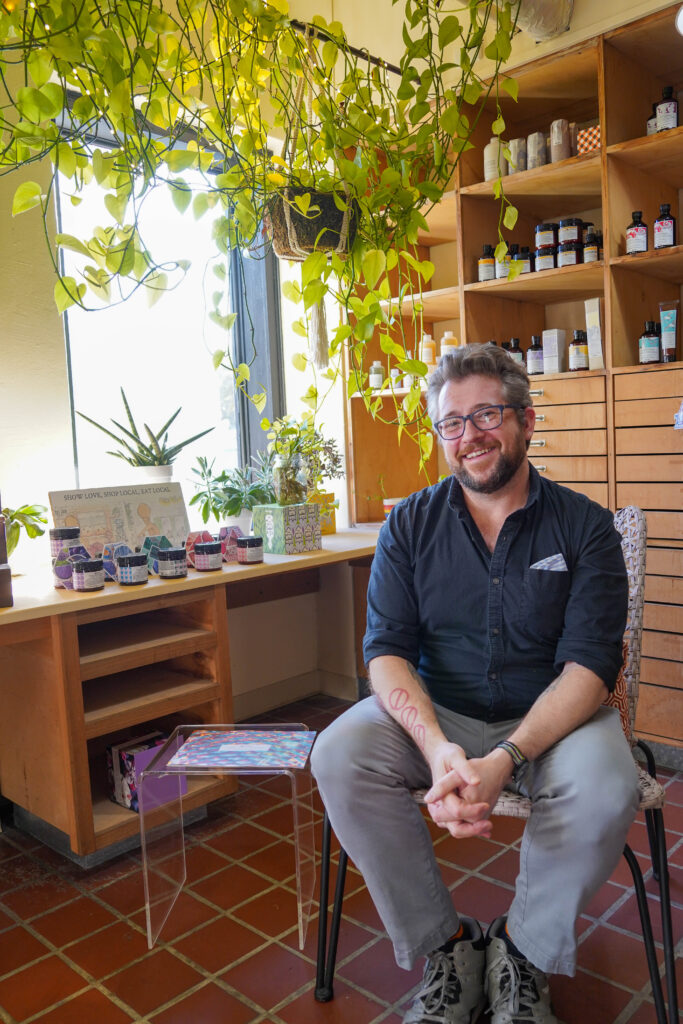
Trent Thomas, 42, has been doing hair for a while now. And the first thing he’ll tell you is how much of a good thing he’s got going.
“I love it here for a million reasons – some superficial – but it really is such a great place to be,” he said, showing off his boss’s massive plant collection visible from the street outside.
Trent was able to keep his job and his paycheck at Orbit Salon, in Birmingham’s Five Points South neighborhood, even when the world slowed down in 2020.
“This neighborhood’s always been so cool and aspirational,” he said. “I think that’s what a lot of stylists look for when going into the industry and what a lot of clients look for in a salon, too.”
Trent said he is grateful for their support and knows not everyone is so lucky.
“It’s not every day you get full-time benefits,” he said. “It’s not a normal thing to have insurance through a salon, like I do. It’s incredibly expensive, and not every salon or stylist in town can afford it.”
Pre-ACA: Life in the coverage gap
Things weren’t always so good, particularly when it came to health coverage. Trent decided to attend cosmetology school in his 30s and started getting insurance at work shortly before he turned 40.
Before then, Trent spent many years without health insurance. After aging out of his parents’ plan in 2003, he spent the next 15 years without employer-provided benefits.
“I grew up in the Birmingham punk scene, and I learned to find resources as close to the ground and as close at hand as I possibly could,” he said. “You make it work from within.”
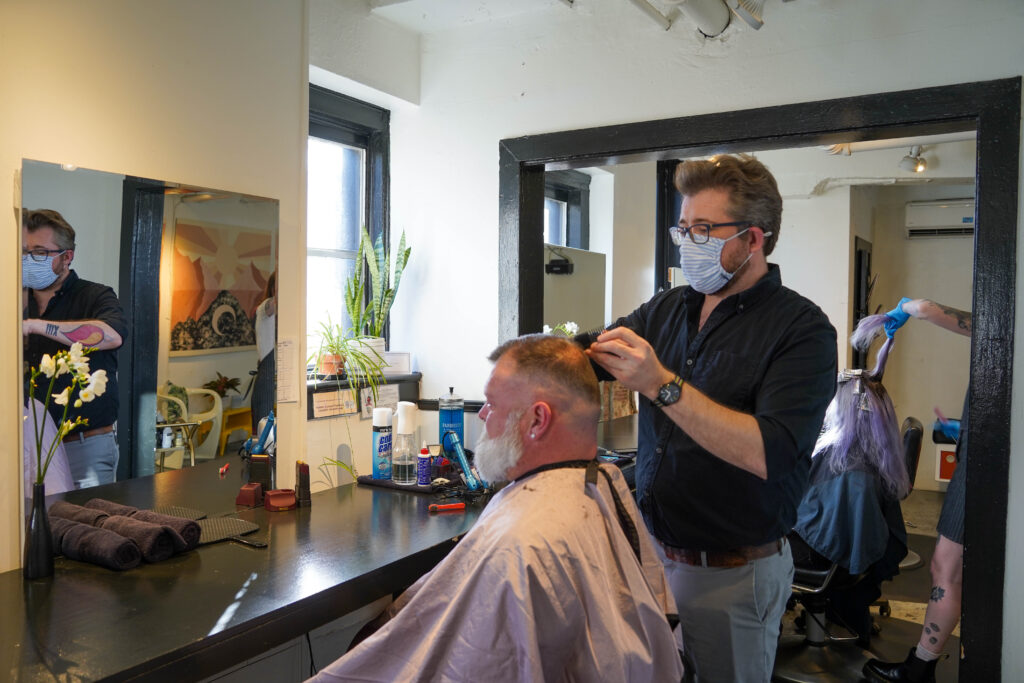
Trent has worked many jobs, including punk rock show promoter and clerk at an art supply store. His story of making things work through sacrifice is one of many – and one that resonates with many stylists.
After the Affordable Care Act was signed into law, Trent found a plan that worked for him and paid out of pocket for premiums. That came after more than a decade of putting off care or finding help through non-traditional means.
Even with ACA coverage, he still lacked dental or vision coverage.
“Everything was always out of pocket,” Trent said. “I paid out of pocket in full for glasses. I used coupons when I could. I used the UAB School of Dentistry for a few fillings and extractions.”
He said the school is an amazing resource for uninsured patients in Birmingham. But he also said the services still require payment up front.
Trent’s biggest sacrifice healthwise came when he suffered a hernia and needed it repaired. He waited years to get surgery to ease the pain.
Access to care for LGBTQ beauty workers in Alabama
Trent also had to find a way to get his daily medications regularly without prescription coverage. Many workers in the beauty industry identify as LGBTQ, and that includes Trent. He’s a gay man who takes PrEP to help protect against HIV, which disproportionately affects gay men.
Pre-exposure prophylaxis (or PrEP) is highly effective for preventing HIV when taken as prescribed. PrEP reduces the risk of getting HIV from sex by almost 99%, according to the Centers for Disease Control and Prevention (CDC). The medication is much less effective when not taken as prescribed, so interruptions in access could raise risk.
During his time in the coverage gap, Trent signed up for clinical research trials to gain access to the life-saving drug. Fortunately, access to PrEP is much easier these days. A few years ago, the manufacturer, Gilead, began offering the drug at low or no cost for anyone who has a prescription.
Patients in central Alabama also can pick up PrEP at local health clinics that offer LGBTQ-focused care. Trent regularly gets his primary care at a practice called the Magic City Wellness Center. The center’s mission is to meet the needs of and reduce disparities in care for LGBTQ people in central Alabama. It is affiliated with Birmingham AIDS Outreach.
Trent made it through the pandemic relatively unscathed until he finally caught COVID-19 in December. He said being able to get regular care from his primary care physician has been a godsend during his recovery.
“I was lucky enough to find a doctor that treats LGBTQ folks like myself for free or on a sliding scale,” he said.
Having health coverage and regular access to preventive care has allowed Trent to recover from COVID-19 on his own time. It also has reduced his risk of becoming more ill or losing his job.
The COVID-19 pandemic forces reevaluations
Trent said recovering from COVID-19 both physically and functionally will be a steep learning curve not just for him, but for the beauty industry as a whole.
“Working on commission, you’ve got to be able to deliver when folks need you to,” he said. “COVID, just like any other disabling condition stylists deal with, comes with nuances that make that sometimes impossible.”
Many stylists are reevaluating their schedules, Trent said. Some are cutting down to three or four days a week. Many are spending less time on their feet whenever they have a spare moment. Striking a balance even when healthy is hard, he said.
“It’s not like doing one haircut is all that taxing. It’s when you’re at the end of the day and you’ve done seven or eight of them,” he said. “Your shoulders and back start to scream at you.”
Many stylists are leaving their jobs or quitting the industry altogether because of rough physical conditions, Trent said. He said he is happy to see more salons working to accommodate disabled and older workers in response. He also called it a “timbre of the times” to see some younger workers organizing for better conditions.
How expanding Medicaid could help an expanding industry
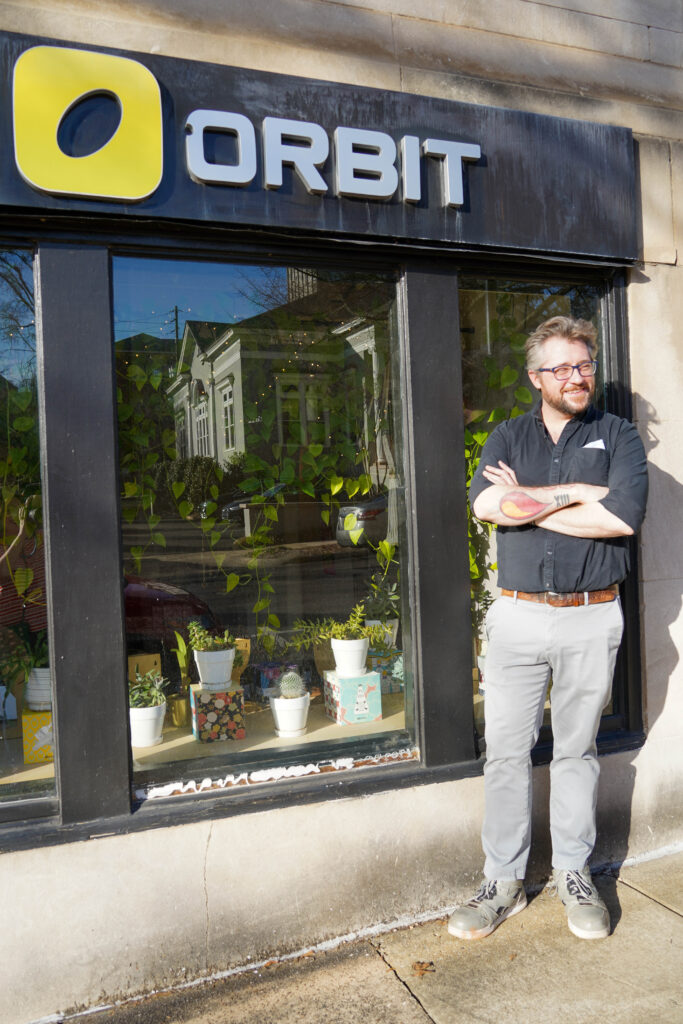
It’s not all sacrifice. There’s plenty of success to go around.
Trent said the future is bright for young stylists. But that better tomorrow will require investments in the industry’s most important assets: people and their health. Trent said he believes full-time benefits and health coverage should be the norm and not the exception for stylists.
About 10,000 stylists and other personal care workers across Alabama would benefit from Medicaid expansion. In total, more than 220,000 Alabamians are caught in the coverage gap, unable to afford health insurance. Another 120,000 or more are stretching to pay for private or employer-based insurance.
Trent said he sees how other states and even other countries ensure their residents can get health care. And he wishes Alabama would step up, too.
“I feel like if our state really did expand Medicaid, it would mean money in the pockets of salons and stylists all over,” Trent said.
He said he believes state leaders should do everything they can to support working Alabamians, including expanding Medicaid.
Trent said the Alabama mindset is often hampered by a “pull yourself up by the bootstraps” philosophy, but state officials aren’t doing enough to equip people to thrive.
“I think that we live in the richest country in the world, and I wish we funded our health care system properly so we weren’t so reliant on for-profit businesses to take care of us,” Trent said. “If there’s money on the table to expand and we’re just letting it sit there, who does that benefit?”
About Alabama Arise and Cover Alabama
Whit Sides is the Cover Alabama storyteller for Alabama Arise, a statewide, member-led organization advancing public policies to improve the lives of Alabamians who are marginalized by poverty. Arise’s membership includes faith-based, community, nonprofit and civic groups, grassroots leaders and individuals from across Alabama. Email: whit@alarise.org.
Arise is a founding member of the Cover Alabama coalition. Cover Alabama is a nonpartisan alliance of advocacy groups, businesses, community organizations, consumer groups, health care providers and religious congregations advocating for Alabama to provide quality, affordable health coverage to its residents and implement a sustainable health care system.

